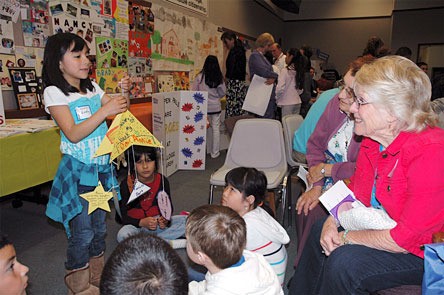MARYSVILLE — Nearly 70 English Language Learners from six elementary schools in the Marysville School District were able to develop their reading and writing skills through hands-on application by writing to more than 30 pen pals, and on May 27, the ELL students got to meet their pen pals in the Marysville School District Board Room.
Not only did the students write letters to their pen pals, and receive letters from them in return, but the students and their pen pals also chose ELL books that they could read together, with the pen pals helping the students through the tough parts. The students and their pen pals even did special projects together, designed to tie back into their correspondence and the books that they’d read.
Marysville School District English Language Learner Teacher On Special Assignment Staci Tuck explained that she’d started the program five years ago with Heidi Johnsen at Liberty Elementary, but has only been able to conduct it for four years.
“Last year, we only had three schools participating,” Tuck said. “We also more than doubled our number of adult mentors this year, to help give the kids something closer to a one-on-one partnership with their mentors.
Tuck noted that last year’s participating ELL students improved their reading and writing scores on the WASL and increased an entire level in English language. She added that seven out of those 10 students passed the Washington Language Placement Test and transitioned out of the ELL program.
“It develops both their literary and their interpersonal skills,” Tuck said. “Teachers have commented to us that participating students who were shy or reticent are speaking and sharing more freely now.”
Emelee Salvador of Pinewood Elementary is the first member of her family to read in English, and she enjoyed showing off the hanging mobile she’d made about one of her books to pen pals such as Joan Penewell. Quil Ceda Elementary’s Richard Meza and Maximo Gonzales demonstrated a cardboard box TV set to pen pal Diana Waters, which explained one of their own books.
“These guys write great letters,” adult mentor Jim Johnson said of his pen pals, Jesus Garcia of Kellogg Marsh Elementary and Brayan Cortes of Allen Creek Elementary. “They’ve entertained me so much with their ideas about the stories we’ve read, especially the mysteries.”
“I’ve got a mind for mysteries,” said Cortes, a second-year pen pal. “If somebody did something, I could find the proof. I like meeting new people.”
“Of course, now that he’s got a girlfriend, I suppose I’ll never get another letter from him,” Johnson laughed.
It was Marysville-Pilchuck High School student Brady Ballew’s first year as a pen pal, but he bonded right away with Kellogg Marsh students Yaroslav Dubyk and Miguel Gonzales.
“We wrote each other once a week, about our books and our lives,” Ballew said. “Their vocabulary has gotten so good.”
“We have a lot in common,” said Gonzales, as he held a paper diorama he’d made about dinosaurs. “We both like soccer and reading.”
Tuck explained that the schools’ principals have seen so much value in the pen pal program that many of them have set aside time for it during the school day. While she welcomes anyone from high school age on up to volunteer as a pen pal for the ELL students, she pointed out that high school students would be screened to ensure that they’re not overcommitting themselves.
“It’s not a big commitment — only two letters a month — but we need to know that our volunteers will be able to follow through,” Tuck said. “A lot of them have gone way beyond that. We need people who can ask questions that draw these kids into conversations. I firmly believe that making those bonds is key to their personal and academic development.”



